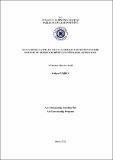DSpace Repository
EVLİ ÇOCUKLU ÇİFTLER İLE EVLİ ÇOCUKSUZ ÇİFTLERİN EVLİLİK DOYUMU VE DEPRESYON DÜZEYLERİNİN KARŞILAŞTIRILMASI
JavaScript is disabled for your browser. Some features of this site may not work without it.
| dc.contributor.author | Özşirin, Gülşah
|
|
| dc.date.accessioned | 2019-06-24T13:12:08Z | |
| dc.date.available | 2019-06-24T13:12:08Z | |
| dc.date.issued | 2019 | |
| dc.identifier.uri | http://hdl.handle.net/11547/2457 | |
| dc.description.abstract | Amaç: Bu çalıĢmada evli çocuklu çiftler ile evli çocuksuz çiftlerin evlilik doyumu ve depresyon düzeylerinin karĢılaĢtırılması, evlilikte çocuk sahibi olma ve olmamanın, depresyon ve evlilik doyumu arasındaki iliĢkiye etkisinin belirlenmesi amaçlanmıĢtır. Yöntem: AraĢtırmaya gönüllü olarak katılan, Ġstanbul ilinde ikamet eden, ilk evliliklerinin içinde olan, kolay ulaĢılabilir durum örneklemesi yöntemiyle seçilen 50 evli çocuklu çift ve 50 evli çocuksuz çiftlerden oluĢan toplam 100 çift yani 200 katılımcı yer almıĢtır. Veri toplama araçları olarak, sosyo demografik bilgi formu, Beck Depresyon Envanteri (BDE) ve Evlilik Doyum Ölçeği (EDÖ) uygulanmıĢtır. Ġki adet form ve iki adet zarf verilerek, formların kapalı zarfta teslim edilmesi, formları her iki eĢin ayrı ayrı doldurması istenmiĢtir. Bulgular: AraĢtırmada gruplar arasındaki BDE puanlarının karĢılaĢtırılması amacıyla bağımsız iki örneklem t testi uygulanarak, normal dağılımlı hale getirilen verilere küp-kök dönüĢümü uygulanmıĢtır. Yapılan analiz sonucunda gruplar arasındaki depresyon düzeylerinde istatistiksel olarak anlamlı bir farklılığın olmadığı bulunmuĢtur. AraĢtırmada gruplar arasındaki evlilik doyum düzeylerinin karışlaştırılması amacıyla EDÖ puanlarının normal dağılımda olmadığı bulunmuş, parametrik olmayan testler kullanılarak analiz yapılmıĢtır. Gruplar Mann-Whitney U Testi ile karĢılaĢtırılmıĢtır. Sonuç olarak, evli çocuksuz çiftler ile evli çocuklu çiftler arasındaki EDÖ puanları arasında anlamlı fark bulunmuĢtur. Evlilik doyumu yüksek çiftlerin depresyon düzeylerinin düĢük olduğu bulunmuĢtur. Evlilik süresinin arttıkça evlilik doyumunun düĢtüğü bulunmuĢtur. Evlilik süresi, çocuk sayısı, cinsiyet, eğitim düzeyi, yaş, sosyoekonomik düzey evlilik doyumu ve depresyon düzeyleri üzerinde önemli değişkenler olduğu bulunmuştur. Sonuç: Evlilik doyumu ve depresyon düzeylerinin gruplara (çocuklu-çocuksuz) ve sosyo demografik değişkenlere göre farklılaştığı bulunmuştur. | tr_TR |
| dc.language.iso | tr | tr_TR |
| dc.publisher | İSTANBUL AYDIN ÜNİVERSİTESİ SAĞLIK BİLİMLERİ ENSTİTÜSÜ | tr_TR |
| dc.subject | Evlilik Doyumu | tr_TR |
| dc.subject | Evlilik | tr_TR |
| dc.subject | Depresyon | tr_TR |
| dc.subject | Çocuk | tr_TR |
| dc.subject | Marriage Satisfaction | tr_TR |
| dc.subject | Marriage | tr_TR |
| dc.subject | Depression | tr_TR |
| dc.subject | Child | tr_TR |
| dc.title | EVLİ ÇOCUKLU ÇİFTLER İLE EVLİ ÇOCUKSUZ ÇİFTLERİN EVLİLİK DOYUMU VE DEPRESYON DÜZEYLERİNİN KARŞILAŞTIRILMASI | tr_TR |
| dc.type | Thesis | tr_TR |
| dc.description.abstractol | Objective: This study, aims to compare the marriage satisfaction and depression levels of married couples with children and married childless couples and was to determine the effect of having and not having children on the relationships between depression and marriage satisfaction. Method: A total of 100 voluntary participants, including 50 couples with married couples with children and 50 married childless couples , residing in Istanbul, who were in their first marriage, were selected by convenient sampling. The socio demographic data form, the Beck Depression Inventory (BDI) and the Marriage Satisfaction Scale (MSS) were applied as data collection tools. Two forms and two envelopes were given, the filled in forms were requested to be delivered in closed envelopes, forms were asked to be filled in by both spouses separately. Findings: In order to compare the BDI scores between groups, independent two sample t-test was applied, and the data was transformed through cube-root transformation to normal distribution. As a result of the analysis, it was found that there was no statistically significant difference in the depression levels between the groups. In order to compare the marriage satisfaction levels between the groups, it was found that the MSS scores were not in the normal range and analyzed using nonparametric tests. The groups were compared with Mann-Whitney U Test. As a result, a significant difference was found between MSS and married childless couples. Depression levels of couples with high marital satisfaction were found to be low. It has been found that the marriage satisfaction decreases as the marriage period increases. Marriage period, number of children, gender, education level, age, socioeconomic level were found to be important variables on marital satisfaction and depression levels. Conclusion: It was found that the levels of marital satisfaction and depression differ according to the groups (child-childless) and socio-demographic variables. | tr_TR |
| dc.publisher.firstpagenumber | 1 | tr_TR |
| dc.publisher.lastpagenumber | 118 | tr_TR |
| dc.identifier.bibliographictag | Özşirin Gülşah, EVLİ ÇOCUKLU ÇİFTLER İLE EVLİ ÇOCUKSUZ ÇİFTLERİN EVLİLİK DOYUMU VE DEPRESYON DÜZEYLERİNİN KARŞILAŞTIRILMASI(2019), İstanbul | tr_TR |
Files in this item
This item appears in the following Collection(s)
-
Tezler -Thesis [17]
